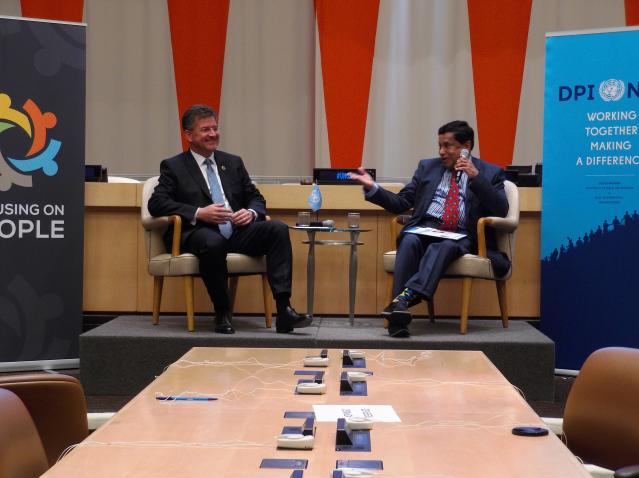One on One with the President of the UN General Assembly, H.E. Mr. Miroslav Lajčák
Date: Friday, 6 October
Time: 11 a.m. - 12 p.m.
Location: ECOSOC Chamber, UNHQ, New York
The 72nd President of the United Nations General Assembly H.E. Mr. Miroslav Lajčák joined UN NGO Relations at the first Briefing of Fall 2017. The President highlighted his agenda as the President of the General Assembly and the importance of civil society engagement.
Mr. Lajčák emphasized the importance of the United Nations, explaining that the Organization is the most important and unique place to bring forth global issues. Recalling his address at the recent general debate, Mr. Lajčák stressed that his main ambitions are to make the UN stronger, more relevant and more efficient.
“The world is changing and we need a strong United Nations. The UN is not only the most representative but also the most relevant address for us to meet and talk,” said Mr. Lajčák.
The President insisted on having a discussion with one another, especially during general debates.
“What is the point of all this dialogue, if we are not listening to each other. We need to make sure that that these discussions lead to an outcome”.
He also underscored the urgent need to develop and design newer mechanisms to resolve global issues and not rely on outdated measures or States’ individual policies.
Charting the progress of the implementation of Agenda 2030, the President expressed concerns that the ongoing work and application of the 17 Sustainable Development Goals will not meet its targets by 2030, unless additional finances are made available. To that extent, he underlined the importance of increasing commercial financial inputs to ensure that the goals are met before deadline.
He also hughlighted the importance of involving youth in political and decision making processes and called on the younger generation to speak out and present their perspectives and issues.
“Let us make sure to increase youth representation at the UN and not treat the younger generation as some kind of exotic animal,” said Mr. Lajčák.
Additional Resources: |
Webcast

